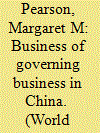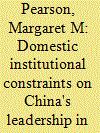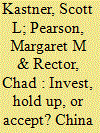| Srl | Item |
| 1 |
ID:
065241


|
|
|
| 2 |
ID:
098097


|
|
|
|
|
| Publication |
2010.
|
| Summary/Abstract |
The study of Chinese foreign policy has long shown that domestic politics and domestic constraints are sources of foreign policy, albeit generally considered less potent than ideology and interests. Domestic political constraints should also be explored as factors in Chinese regional policies toward East Asia, including regional economic institutions. This paper examines three domestic institutional constraints on regional foreign policy in the area of trade and economics: a fragmented decision-making structure that has difficulty with coordination, a relatively heavy reliance on top level decision-makers at a time when issues of Asian economic policy have relatively low priority for these same decision-makers, and the relatively extreme lack of autonomy for negotiators vis- -vis top decision-makers in Beijing. These constraints are by any means unique to China. However, at a time when many observers and participants are expecting-indeed, often hoping for-Chinese leadership in the region, the paper posits that these constraints hinder the PRC's ability to fill this role. The key empirical focus is regional trade agreements and regional economic organizations.
|
|
|
|
|
|
|
|
|
|
|
|
|
|
|
|
| 3 |
ID:
147906


|
|
|
|
|
| Summary/Abstract |
China has played an inconsistent role in multilateral governance, sometimes contributing to the creation and maintenance of international regimes, sometimes free riding or even threatening to undermine multilateral regimes to improve its position. We show that the strategic context of a particular issue of international concern affects China's approach to multilateralism and argue that our approach adds additional leverage to existing theories that rely on assumptions about its inherent disposition or socialization processes. An emerging global power will be willing to invest more in supporting a regime when its outside options are relatively poor. When its outside options are good, it will free ride on the efforts of more established states if it is not a necessary player in maintaining regimes, and if it is seen as indispensable it will threaten to hold up regime support as a way to win concessions. We show that these two factors, outside options and indispensability, can help explain changes in China's strategy with respect to the issue of North Korea's nuclear program and the regulation of international finance.
|
|
|
|
|
|
|
|
|
|
|
|
|
|
|
|
| 4 |
ID:
144369


|
|
|
|
|
| Summary/Abstract |
Why do local officials in China often fail to comply with directives of the central leadership in Beijing? Existing scholarship suggests that local defiance results from reform-era decentralization, or from the difficulty of managing agents in a complicated policy environment. In contrast, we conceptualize threats by Beijing to punish local officials as deterrence signals, and analyze local officials’ reactions to these signals as a dynamic process in which they consider the selectiveness, severity and retractability of sanctions, and the reputation of the center, when deciding to defy. Examining the case of Beijing’s application of the seemingly powerful “hold-to-account” practice to curtail investment in iron and steel in 2004, its punishment of local officials in the “Tieben Incident”, and the continued defiance of other local officials, we analyze the dynamics of central–local relations that lead to the failure of the center’s deterrence efforts.
|
|
|
|
|
|
|
|
|
|
|
|
|
|
|
|